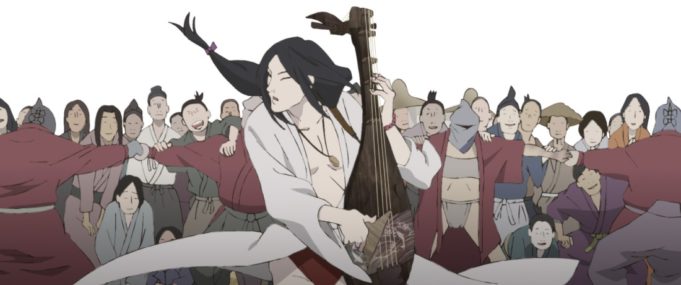Playing at multiplexes and the Modern Art Museum this weekend, Masaaki Yuasa’s Inu-Oh is a heady mash-up of Noh theater and glam rock that cements his status as one of anime’s most promising and adventurous filmmakers. Based on Hideo Furukawa’s novel, the story picks up in 14th-century Japan, still divided by the long-resolved Genpei War that resulted in the ruling Heike clan being overthrown by the Genji. The losing Heike still tell stories of their fallen heroes and glorious defeats through bards who play biwa, a lute played with a special implement.
Into this environment steps Tomona (voiced by Mirai Moriyama), who dares to play a different style of music while wearing makeup and long hair. He meets Inu-Oh (voiced by the non-binary rock singer Avu-chan), who has been cursed to be hideously ugly, with one arm longer than his legs while the other sprouts out of his head. Tomona — who displeases his ancestors by changing his name to Tomoichi to gain entrance into the musicians’ guild — is the only one who isn’t repulsed by Inu-Oh’s appearance, having been blinded at an early age. Together, the two draw hordes of screaming fans and make enemies among established theater troupes, traditional biwa players, and the shogun (voiced by Tasuku Emoto), who sees them as a threat to a tenuously united country.
Without a doubt, the highlight of the film is the musical numbers, which mostly take place under a bridge in Kyoto where Tomoichi and Inu-Oh stake out their performing space. Rather than show us how Noh revolutionized theatrical entertainment in its time, the movie goes all Moulin Rouge! on us with proudly anachronistic rock opera. Tomoichi plays electric guitars alongside the traditional shakuhachi and taiko, while Inu-Oh breakdances and pulls moves that would be impossible for a person with a normal body. (With his features hidden by his costume, the crowd assumes that what he’s doing is just clever stagecraft.) His song “The Whale” is reminiscent of “We Will Rock You” with its stomping rhythm and call-and-response with the audience. Where the old-school theater groups perform from a rotating canon of stories, Inu-Oh and Tomoichi invent new stories about the Heike with laser lights and a harnessed Inu-Oh running up a huge cloth banner. Avu-chan is having a moment at our multiplexes, with their Japanese-language cover of “Stayin’ Alive” being featured in Bullet Train as well, and their galvanizing singing helps make this a more successful musical than Yuasa’s previous Lu Over the Wall.
All this makes it easy to overlook the pathos when the shogun takes our heroes’ invention away from them and gives it to his own theater troupe. That part doesn’t work so well, but never mind. Just marvel at the audacity of Inu-Oh as it pushes the boundaries of anime, musical films, and movies about Noh, injecting these old forms with a freshness that will make you want to clap along.
Inu-Oh
Voices by Avu-chan and Mirai Moriyama. Directed by Masaaki Yuasa. Written by Akiko Nogi, based on Hideo Furukawa’s novel. Rated PG-13.












